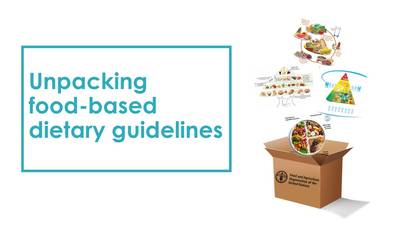Unpacking food-based dietary guidelines

Date: 04 June 2019
Introduction by: Anna Lartey, Director of the Nutrition and Food System Division, FAO
Presenter: Fatima Hachem, Senior Officer, Nutrition Education and Consumer Awareness Team, Nutrition and Food Systems Division, FAO
Moderator: Ana Islas, Nutrition Officer, Nutrition and Food Systems Division, FAO
Recording: http://fao.adobeconnect.com/pd4k7jjv1ip6/
Abstract: In the arena of food and nutrition, consumers around the globe are bombarded with information and advice on how to eat better in order to improve health and well-being. Having dietary guidelines that are food-based, built on scientific evidence and culturally and economically appropriate to the local context is what governments have been engaged in establishing in the last few decades. Although these guidelines were thought essentially as a consumer education tool, the data and information base on which they are founded goes beyond the nutritional problems at country level to span a wide area of related sectors and policies. This renders the dietary guidelines useful for a wide range of other usages while addressing the local public health and nutrition priorities, including public procurement, social protection, food subsidies, food security and nutrition policies and agricultural policies.
FAO has been actively assisting Member Countries in the development, implementation and revision of their Food-based Dietary Guidelines (FBDGs) and has been periodically reviewing the progress made in the development and use of FBDGs as well as tracking changes in their overall focus and orientation. FAO also hosts a growing online repository of FBDGs which is proving useful for researchers and policy-makers alike.
This webinar provided an overview of food-based dietary guidelines focusing on the following questions:
- What are national FBDGs?
- How have they been traditionally used?
- What is their potential use?
The webinar also highlighted some examples of national FBDGs across the world, and presented FAO’s current work in this field.
